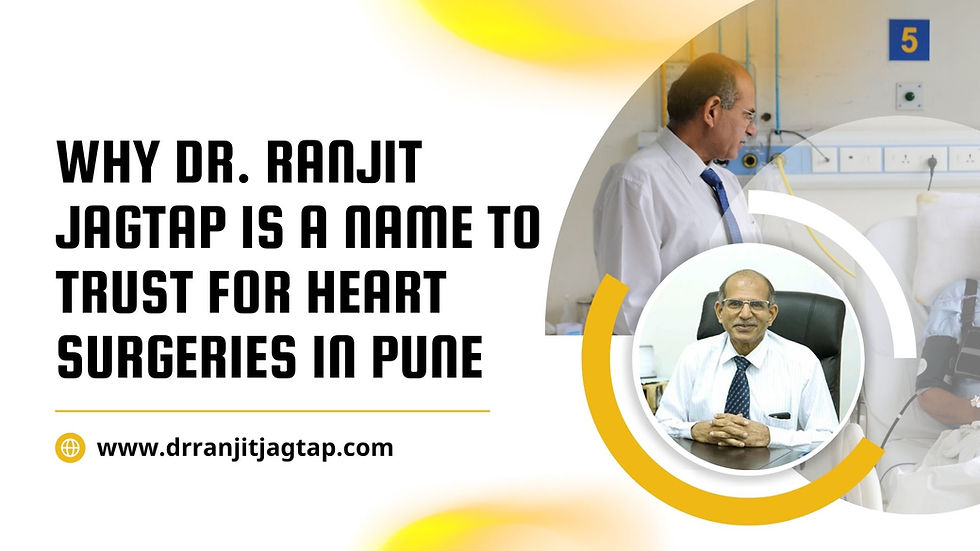Dr Ranjit jagtap News: Here's What You Should Know about Heart Arrhythmias
- drranjitjagdap
- Mar 30, 2022
- 3 min read
An arrhythmia occurs when the electrical signals that control your heartbeat fail. These problems might result in abnormalities or odd rhythms in a normally steady pulse. Arrhythmias can occur at any age, but they are more common in the elderly. You are more likely to develop an arrhythmia if you are overweight or drink excessively.
Dr Ranjit Jagtap is a well-known cardiothoracic surgeon in Pune. He is serving since 1988. He almost performed more than 30,000 heart surgeries till now. Following is the information about Heart Arrhythmias that you should know.

What re the causes of Heart Arrhythmias?
A cardiac arrhythmia can be caused by a variety of circumstances, including:
Coronary artery disease (CAD)
Electrolyte imbalances, such as sodium and potassium
Changes in your heart muscle, which are frequently caused by cardiomyopathy and can be caused by ageing, high blood pressure, diabetes, and thyroid illness.
The recovery period following cardiac surgery
What are the different types of arrhythmia?
Arrhythmias are classified into four types:
Premature ventricular contractions are skipped heartbeats that everyone experiences from time to time, and are frequently associated with excesses in stress, coffee, nicotine, or exercise.
Atrial fibrillation causes the heart to beat irregularly and more quickly than usual.
Supraventricular tachycardia, causing your heart to accelerate even when you're generally quiet and at rest.
Bradycardia is a condition in which your heart beats more slowly than usual.
Heart block is a condition in which your heart beats slowly, causing you to collapse at times.
How to diagnose Arrhythmia?
According to Dr Ranjit Jagtap News, if you experience signs of an arrhythmia, you should consult a cardiologist. You might wish to consult with an electrophysiologist, a cardiologist who has further specific training in the diagnosis and treatment of cardiac rhythm abnormalities. Following an evaluation of your symptoms and a physical examination, the cardiologist may undertake a number of diagnostic procedures to assist confirm the presence of an arrhythmia and identify its causes.
You can detect arrhythmias by a set of tests that track the electrical impulses that govern your heart:
An electrocardiogram (ECG) is a basic test that measures the rhythm of your heart.
A 24 hour ECG is a long-term measurement of your heart rhythm in which you go about your normal everyday activities while wearing a holter monitor.
An Exercise ECG is a test that measures the rhythm of your heart while you're on a treadmill or exercise bike.
A cardiac event recorder, which records symptoms over a longer period of time as they occur.
An electrophysiology (EP) examination in which soft wires go through a vein in your leg and into your heart; it may seem awful.
An echocardiogram (echo), which is a cardiac ultrasound study.
How to treat Arrhythmia?
Treatment for arrhythmia will, as you might expect, vary depending on the type of arrhythmia you have. Among the treatments are:
Medication that stops, prevents, or regulates your arrhythmia.
Cardioversion is a procedure that involves administering electrical shocks to your heart while you are asleep in order to restore its rhythm.
Catheter ablation is a minimally invasive procedure that removes the tissue that is causing your arrhythmia.
A pacemaker is a tiny battery-powered device placed in your chest that generates electrical signals that cause your heart to beat normally.
An ICD is similar to a pacemaker in that it monitors your cardiac rhythm and shocks it back to normal when necessary.
Conclusion
Visit Dr Ranjit Jagtap Clinic to get the top-notch heart health services in Pune. Here you will get high-quality treatment for any kind of heart problem. The surgeons, physicians, and doctors here are highly professional and provide full care and support to their patients.





Comments